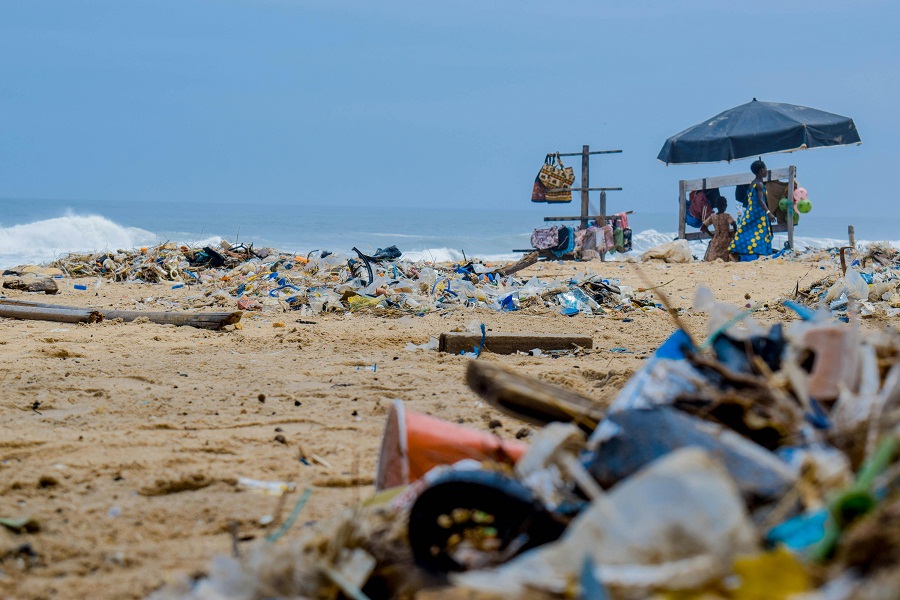World Ocean Day 2024: Fighting plastic waste and climate effect

Published :
Updated :

Every June 8th, World Oceans Day is celebrated worldwide as a reminder of our oceans' vital role in our planet's health. This year's theme, "Catalyzing Action for Our Ocean & Climate," highlights the critical connection between healthy oceans and a stable climate and emphasizes the importance of oceans in our lives.
Oceans play a critical role in regulating the Earth's climate. They absorb carbon dioxide and produce oxygen, acting like the planet's lungs. Healthy oceans are essential for a healthy environment. Bangladesh, with its vast coastline along the Bay of Bengal, is a beautiful example of a nation heavily dependent on a healthy ocean.
The Bay of Bengal is crucial to Bangladesh. This vast body of water supports the country's economy through fishing, shipping, and tourism. Many people depend on the Bay for their livelihoods.
However, rising sea levels, frequent cyclones, and extreme weather events are significant threats to these coastal areas.
These challenges are rare in Bangladesh. All oceans face threats like overfishing, plastic pollution, ocean acidification (caused by excess carbon dioxide), and rising sea levels. Globally, millions of tons of plastic end up in our oceans yearly.
Unfortunately, the Bay of Bengal is not spared from this alarming trend.
According to UNESCO's results, plastic waste constitutes 80% of all marine pollution. Approximately 8 to 10 million metric tons of plastic enter the ocean annually.
The EPA (Environmental Protection Agency) has stated that 100% of all plastics humans have ever created exist. Plastic generally takes between 500 and 1000 years to degrade. Even then, it becomes microplastics without fully degrading. About 50-75 trillion pieces of plastic and microplastics are in the ocean.
Most plastic in the ocean comes from land, flowing downstream through rivers to the sea. At first, it may stay in coastal waters, but it can soon be picked up by rotating ocean currents, called gyres, and transported anywhere in the world.
A healthy ocean is essential for a stable climate and vice versa. A healthy ocean absorbs carbon dioxide, a greenhouse gas that traps heat. But a polluted and damaged ocean loses this ability.
UNESCO says that Plastic contamination in the ocean has severe consequences for marine life and ecosystems. One of the most noticeable effects is the harm that plastic products cause animals when they come into contact with or consume them, resulting in breathing difficulties, entanglement, broken bones, infections, and internal injuries.
Notably, 17% of the species harmed by ocean plastic are on the International Union for Conservation of Nature (IUCN) Red List of Threatened Species.
Besides, floating plastic waste can transmit invasive species, further threatening marine ecosystems, biodiversity, and the food chain.
In a conference, the UN said that The ocean has absorbed over 90% of the excess heat in the climate system, and ocean warming has more than doubled since 1993.
Bangladesh is taking action. The country has implemented policies to conserve its oceans and build resilience against climate change. These include protecting mangrove forests, natural barriers against storms, and promoting sustainable fishing practices.
On a global level, the United Nations, UNEP, and FAO have launched a 12-month action campaign to save our oceans. This campaign includes various activities to reduce plastic pollution and promote marine conservation.
Everyone can help protect our oceans. Reducing plastic waste, participating in mangrove planting, and supporting sustainable fisheries are simple actions that make a big difference. These steps can help ensure a healthier ocean and a stable climate for future generations.
shemultahmina2717@gmail.com


 For all latest news, follow The Financial Express Google News channel.
For all latest news, follow The Financial Express Google News channel.